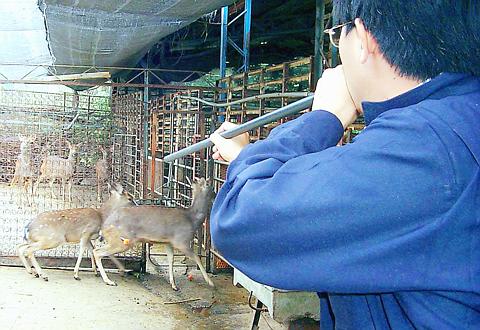Citing the results of tests yesterday, officials at the Council of Agriculture announced that the latest outbreak of deadly foot-and-mouth disease (FMD) has been contained to one farm in Changhua County. The statement came in the face of reports yesterday that claimed the outbreak had spread from a dairy goat farm -- where it forced the slaughter of over 200 animals on Wednesday -- to other farms in the county.
Sung Hua-tsung (宋華聰), deputy director of the council's animal quarantine department, said yesterday that "no trace of the disease" had been found after investigating conditions at two farms in Homei and Shenkang townships.
Earlier yesterday, local agriculture officials rejected reports of the disease spreading as "rumors," but acknowledged that local health authorities were investigating the farms.

PHOTO: CHIU YI-FEIN
Still, officials ordered goat markets in two southern counties to close operations for a week while the checks continue.
Over 200 dairy goats had to be killed at a farm in Changhua's Fanyuan township on Wednesday following the deaths of 22 others from the deadly livestock disease.
This reappearance of FMD -- the first to affect Taiwan's goat population -- follows outbreaks of the disease less than a month ago on cattle farms in Yunlin and Chiayi counties.
Sung said FMD had not spread to any of the 30-odd cattle, hog, goat or deer farms within the 3km quarantined radius around the Fangyuan farm.
The virus does not affect humans, so goat meat and milk are both safe, Sung said.
Animal quarantine department director Li Chin-lung (
The COA said yesterday that the O-Kinmen strain of the virus -- the same as the one which struck cattle in last month's outbreak -- was introduced to Taiwan by smuggled animals or meat products from China. It was then brought into Changhua County by someone transporting an infected animal, they said.
Humans are particularly effective transmitters of the virus as they can carry it in their nostrils for seven days, said Sung.
For the second time in a month, the Council has ordered all cloven-hooved animals in Taiwan immunized against FMD.
Council chairman Lin Shiang-nung (
Over 90 percent of the pig and cattle populations across the nation have already been immunized against the disease, he told reporters yesterday morning.
Only 60 percent of goats and 40 percent of deer have been immunized, making these animals more vulnerable to the disease, Lin said.
The council is also getting tough, however. It said yesterday that farmers whose stock is infected with FMD and who have not immunized their stock may be subject to a fine of NT$50,000.
Meanwhile, the outbreak may seriously affect goat prices and goat products as public fear of the virus sets in.
Goat markets in Kaohsiung and Yunlin counties have been suspended for the next week. They plan to open again on Feb. 24, but may extend their closing time depending on the progress of the outbreak.
The FMD virus inflicted heavy losses on Taiwan's pork industry in March 1997 when more than half of the nation's estimated 7 million pigs were slaughtered.

CHAOS: Iranians took to the streets playing celebratory music after reports of Khamenei’s death on Saturday, while mourners also gathered in Tehran yesterday Iranian Supreme Leader Ayatollah Ali Khamenei was killed in a major attack on Iran launched by Israel and the US, throwing the future of the Islamic republic into doubt and raising the risk of regional instability. Iranian state television and the state-run IRNA news agency announced the 86-year-old’s death early yesterday. US President Donald Trump said it gave Iranians their “greatest chance” to “take back” their country. The announcements came after a joint US and Israeli aerial bombardment that targeted Iranian military and governmental sites. Trump said the “heavy and pinpoint bombing” would continue through the week or as long

TRUST: The KMT said it respected the US’ timing and considerations, and hoped it would continue to honor its commitments to helping Taiwan bolster its defenses and deterrence US President Donald Trump is delaying a multibillion-dollar arms sale to Taiwan to ensure his visit to Beijing is successful, a New York Times report said. The weapons sales package has stalled in the US Department of State, the report said, citing US officials it did not identify. The White House has told agencies not to push forward ahead of Trump’s meeting with Chinese President Xi Jinping (習近平), it said. The two last month held a phone call to discuss trade and geopolitical flashpoints ahead of the summit. Xi raised the Taiwan issue and urged the US to handle arms sales to

State-run CPC Corp, Taiwan (CPC, 台灣中油) yesterday said that it had confirmed on Saturday night with its liquefied natural gas (LNG) and crude oil suppliers that shipments are proceeding as scheduled and that domestic supplies remain unaffected. The CPC yesterday announced the gasoline and diesel prices will rise by NT$0.2 and NT$0.4 per liter, respectively, starting Monday, citing Middle East tensions and blizzards in the eastern United States. CPC also iterated it has been reducing the proportion of crude oil imports from the Middle East and diversifying its supply sources in the past few years in response to geopolitical risks, expanding

OTHER OPTIONS: Given possible US intervention and Taiwanese counterattacks, China might opt to blockade Taiwan or take its outlying islands instead of an all-out invasion A US think tank has urged Taiwan to adopt a “hellscape” strategy that would flood the Taiwan Strait with drones and other uncrewed systems to deter invasion by China. In its report, Hellscape for Taiwan, published on Thursday, the Center for a New American Security said Taipei’s asymmetric defense approach — often described as a “porcupine strategy” — needs to evolve to keep pace with the growing capabilities of the Chinese People’s Liberation Army. The “hellscape” strategy involves saturating the air and waters around Taiwan with thousands of drones and other platforms capable of striking invading forces from multiple domains at once. Long-range